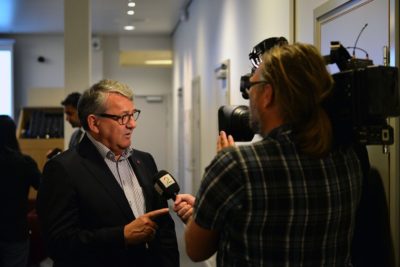Norway’s state auditor general (Riksrevisjonen) has decided to examine how the Oil & Energy Ministry has handled its role as the major owner of oil company Equinor. The goal is find out why Equinor’s major shareholder wasn’t aware of the oil company’s huge losses on investments it made in the US.

Newspaper Dagens Næringsliv (DN) reported Thursday afternoon that Auditor General Per-Kristian Foss has confirmed that his watchdog agency was starting an examination of the state’s ownership role in Equinor, formerly Statoil.
“We had a similar investigation in 2011, and wrote that it was important for the Oil & Energy Ministry to closely follow the foreign investments being made by what was then called Statoil,” Foss told DN. “When the state auditor’s report was handled in Parliament, both the ministry and the Parliament said they would. Now we want to see what has happened in the meantime.”
He acknowledged that the new probe follows DN‘s exposure this spring of how Equinor’s losses on its US operations have amounted to a stunning USD 22 billion (NOK 200 billion) over the past 20 years. “The Auditor General’s office doesn’t live in its own world,” Foss told DN.
Business culture criticized
Oil Minister Tina Bru has admitted that the ministry was unaware of the extent of the losses until DN reported on them along with Statoil/Equinor’s big-spending at its offices in Houston. Norwegian and US executives based in the US were paid high salaries by Norwegian standards, drove fancy and expensive cars, hosted big parties for both employees and business associates, and were repeatedly warned by internal auditors that their losses and spending were spinning out of control.
It all amounted to a business culture far removed from the norm in Norway, and Bru publicly scolded Equinor’s current management over the culture and questionable investments that flourished seemingly undetected. Members of Parliament have also reacted strongly to the news about Statoil/Equinor, and wondered why ministry officials hadn’t reacted to the losses or the business culture in Houston earlier.
At stake is how the government manages its investments on behalf of the state, which remains Statoil/Equinor’s single largest shareholder with a 67 percent stake. While many other state investments in large Norwegian companies are managed by the ministry for business and trade, the oil ministry has remained responsible for the large oil company that was founded and initially wholly owned by the Norwegian state.
Foss told DN that the state auditor general will now examine the so-called “dialogue” between the ministry and the current Equinor’s management, “and see how the ministry has steered the company.” He stressed that his office won’t be auditing Equinor’s actual US investments like shale oil and gas projects and deep-water projects in the Gulf of Mexico.
Equinor ‘should have been more open’
The state auditor general’s office has already questioned how the state was monitoring its stake in the former Statoil after the company wrote off around NOK 94 billion between 2013 and 2017 on its foreign investments in general. Statoil/Equinor has also been criticized by analysts over its failure to follow state regulators’ recommendations that it break the US investments out of its other international investments. Losses in the US accounted for more than half of the total losses. Equinor finally gave in to calls to break US results out of its international results last month.
Oil Minister Bru has complained to Equinor that it “should have been more open” with the ministry that she took over just five months ago. Her predecessors and other ministry officials arguably should have asked more questions over the years, too. The ministry was under the political control of the conservative and pro-oil Progress Party from 2014 until Bru of the Conservative Party was tapped when Progress withdrew from the Conservatives-led government coalition. Before that, the also-pro-oil Center Party held political control from 2005 to 2013, during the former left-center government led by Labour.
Former CEO still mum
Bru has recently claimed that she’ll be following Equinor much more closely from now on, while calls have gone out for an independent investigation of Statoil/Equinor itself led by Parliament. The investments that went bad and the much-criticized business culture that flourished at the former Statoil in Houston were mostly initiated during the tenure of the company’s former CEO Helge Lund, who’s now the chairman of BP.
Lund has remained silent on what has been called Norway’s biggest industrial scandal ever, steadfastly refusing to answer questions. Lund stands to be called in to Parliament, however, especially if it’s decided that its disciplinary committee should take on an investigation.
NewsInEnglish.no/Nina Berglund

